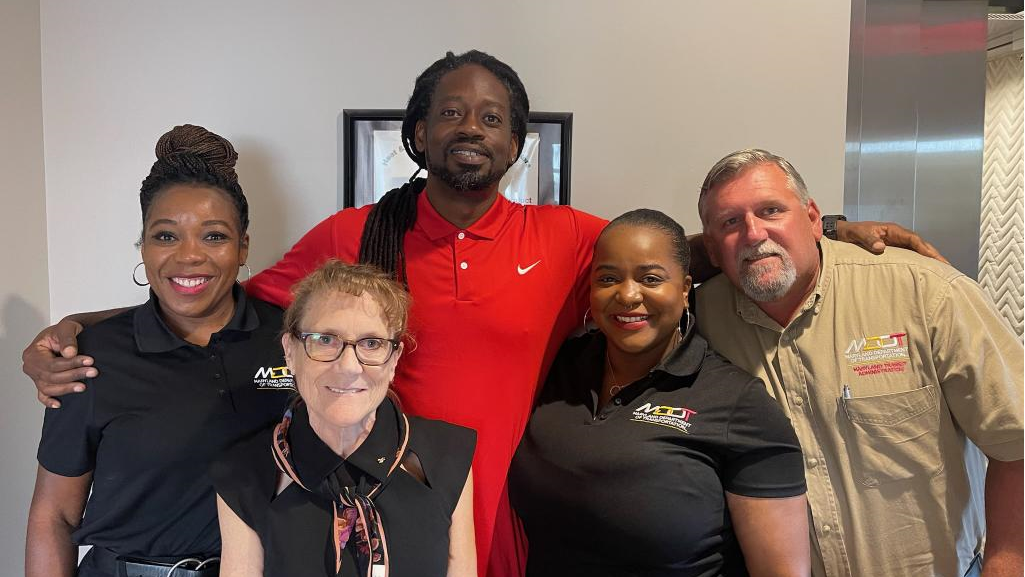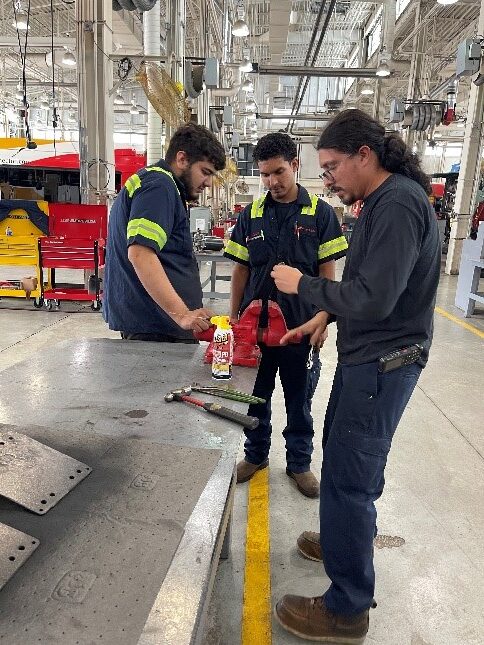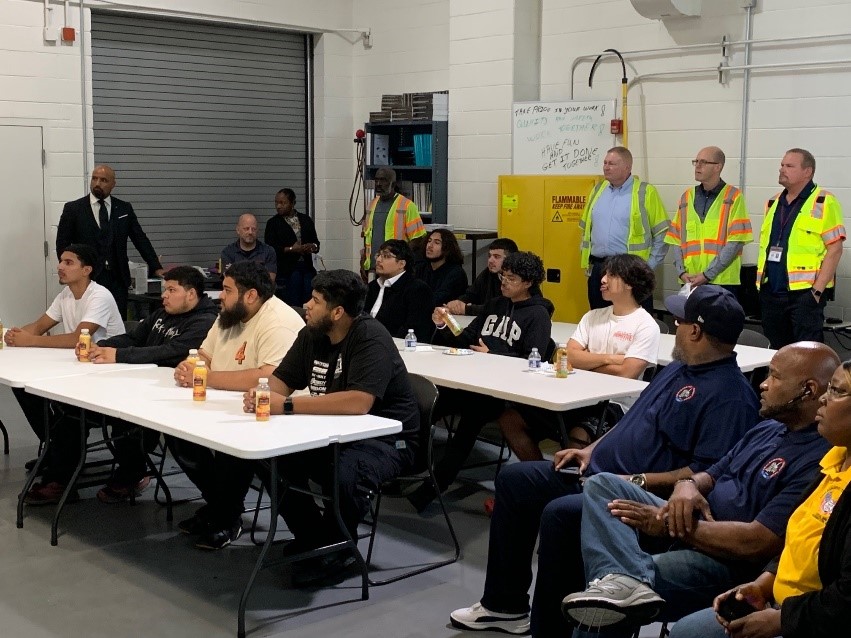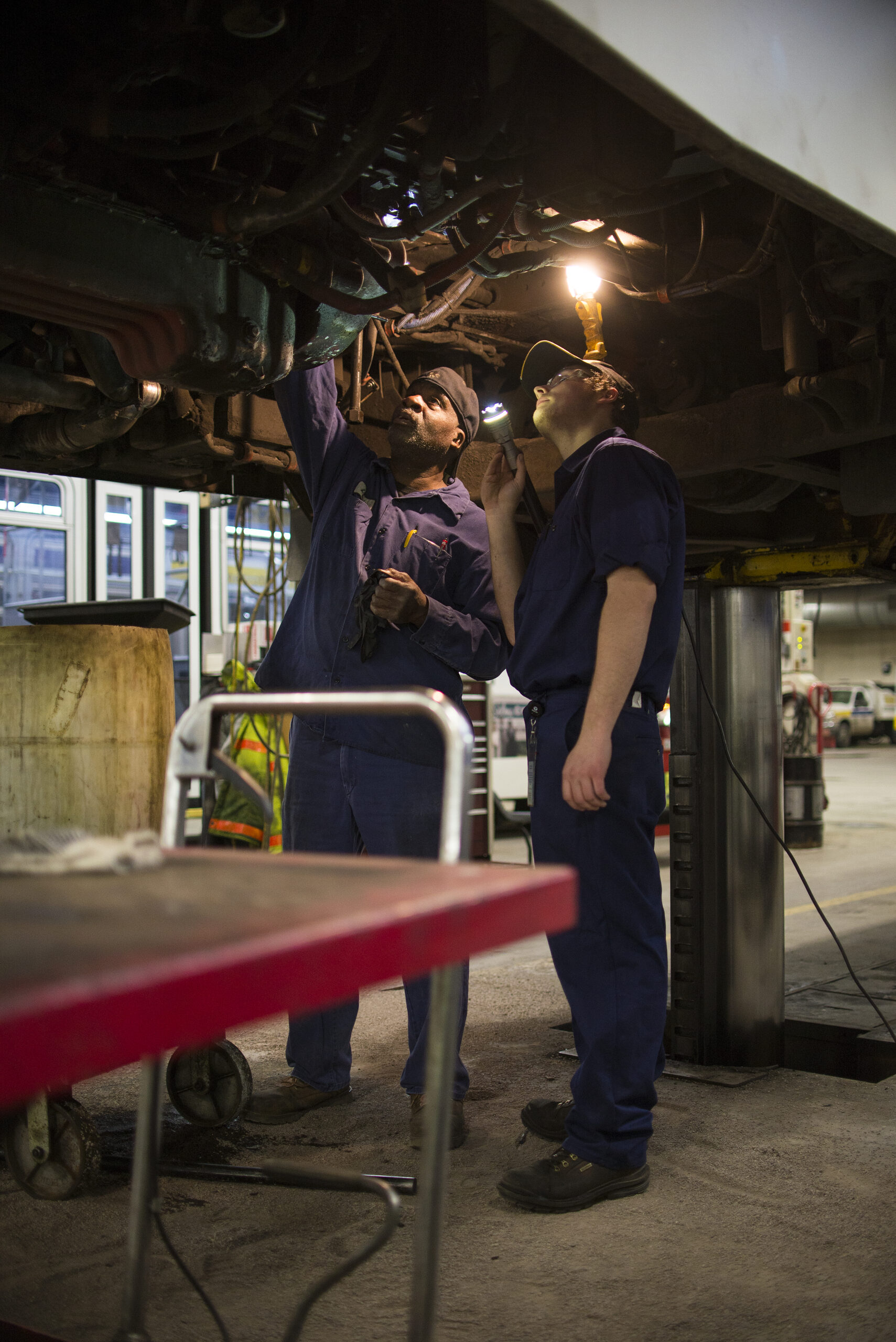Transit Workforce Initiatives
Transit Apprenticeship Gaining Momentum
Over the last two years, the transit industry has made significant gains in establishing apprenticeship programs for frontline workers. As George Fields, General Manager for Human Resources at Greater Cleveland Regional Transit Authority notes, “Building out our apprenticeship programs helps us to answer the long-term training needs for the future of our workforce.” Adds Amalgamated Transit Union’s Director of Workforce Development and Apprenticeships Jamaine Gibson, “Apprenticeship programs are the gold standard for training, career advancement, and turning what has been considered to be just a job into a true profession.”
To those ends, TWC created the American Transit Training and Apprenticeship Innovators Network (ATTAIN), a network for anyone interested in apprenticeship for frontline transit careers. The ATTAIN peer network creates forums for agencies interested in apprenticeships and those already operating them to share knowledge. When individuals sign up for ATTAIN, TWC staff emails new members with links to resources, information relevant to the occupation they expressed interest in, and the offer to set up a one-on-one meeting to discuss how apprenticeship could benefit their transit location. So far, 173 individuals have signed up!
ATTAIN members also receive notice of sessions covering apprenticeship programs for bus operators and technicians, as well as railcar, facilities, signals, and elevator-escalator maintainers. ATTAIN sessions meet virtually, and each one focuses on apprenticeship for specific occupations, inviting agencies and unions to showcase current programs. The meetings provide an opportunity for attendees to ask any questions that they might have about apprenticeships, to discuss any difficulties they have been facing, and to share their experiences with apprenticeship’s impact on the workforce and the agency as a whole. Agencies provide peer guidance to each other during these meetings, and there is always a standing offer for follow-up assistance from TWC team members.
The most recent meeting took place on September 12 and focused on rail and facilities occupations. Labor and management representatives from Metropolitan Atlanta Rapid Transit Authority (MARTA) and San Diego Metropolitan Transit System (MTS) described their programs—MARTA’s rail car maintenance and MTS’s light vehicle rail maintenance—followed by questions from and discussions with session participants. Recordings of previous gatherings covering apprenticeship in other occupations can be accessed through TWC’s Resource Center, and visit the ATTAIN and Apprenticeship page for more information on ATTAIN and apprenticeship resources, such as FAQs. If you have an active apprenticeship program, are starting one, or are interested, consider signing up for ATTAIN and also reaching out to TWC at twc@transportcenter.org for support.
TWC celebrates all locations that have instituted and are working on developing registered apprenticeships. TWC has worked with several locations, listed below, that have recently implemented registered apprenticeships and would like to congratulate them on their accomplishments.
| Transit Agency and Union Local | Registered Apprenticeship Occupation |
| MDOT MTA / ATU Local 1300 | Bus Maintenance |
| Fairfax Connector / ATU Local 689 / Teamsters Local 639 | Bus Maintenance |
| GCRTA / ATU Local 268 | Bus Maintenance |
| IndyGo / ATU Local 1070 | Bus Operator |
| KCATA / ATU Local 1287 | Bus Maintenance |
| Metro Transit / ATU Local 1005 | Bus Maintenance |
| SEPTA / TWU Local 234 | Welding |
TWC staff spoke with representatives from several of these locations who shared their varied perspectives on their programs as well as their thoughts on paths to implementing a registered apprenticeship program. Read on to learn more!
Maryland Department of Transportation Maryland Transit Authority and Amalgamated Transit Union Local 1005 – Baltimore, Maryland
Earlier this year, MDOT MTA and ATU Local 1005 received approval from the Maryland Department of Labor for the registration of their joint bus maintenance apprenticeship program. The agency and union worked diligently and collaboratively to develop a program that works for the agency and its new and incumbent technicians.
MTA has experienced the same difficulties that other transit agencies face in recruiting and hiring skilled mechanics, and this was the major motivating force behind setting up an apprenticeship program. “We were looking for a way to be able to fill vacancies, while also supporting a skilled workforce. Developing an apprenticeship program would allow us to both recruit and develop skilled mechanics to keep up with our business needs,” explains Brandee Gross, Workforce Development Program Manager at MDOT. Apprenticeship, Brandee notes, provides a revolutionary way to provide a critical community service through active recruiting and hiring in the community, meeting the training needs of incumbent workers, and ensuring the community receives quality transit service. She continues, “We will be able to better meet service needs and continue to ensure that the work we do is safe and reliable, providing the foundation for other apprenticeship programming within MTA which will improve service and reliability across the board.”

First Row: Selina Allen (Senior Chief Organizational Development and Employee Training (ODET)-HR – MDOT The Secretary’s Office (TSO), Jane Sinclair (Apprenticeship Navigator – MDOL), Brandee Gross (Program Manager, Workforce Development, ODET-HR – MDOT TSO), Mark Burkhardt (Director Bus Maintenance – MTA)
Second Row: Kylee Parker Sr. (A-Repairman, JAC Chairman, Bus Maintenance – MTA)
Securing commitment to apprenticeship at the executive levels of both the local union and agency management is critical to the development of any registered apprenticeship program in a unionized agency. Although both the union and management could see the benefits of a registered apprenticeship program and continued to work towards it, a series of administrative changes made it difficult to have the continuous support needed to move forward to implementation. According to Brandee, the key was having resolve and being prepared. She had a presentation at the ready that was her “elevator pitch on the benefits of apprenticeship programming.” She also continued to work on the areas that she could move forward on without additional support. “I realized it made it easier to make a case for apprenticeship programming when you had something tangible to present as progress,” she said.
“Start yesterday!” is Brandee’s advice to other agencies thinking about starting an apprenticeship program. “Engage your union early, they are your partners and greatest asset in development of apprenticeship programming.” She recommends assembling a quality team to help that is just as passionate about apprenticeship program development. Lastly, Brandee acknowledges that anything truly worth it will have its fair share of issues and drama. “Stick with it and ask for help and support from people who have done it before, and it will all work out in the end.”
Fairfax Connector, ATU Local 689, and Teamsters Local 639 – Fairfax, Virginia
Fairfax Connector is a local bus system in the Northern Virginia region. About a year ago, the agency’s service provider, Transdev, was struggling to find technicians to support its workforce. Transdev reached out to TWC for assistance in establishing a registered bus maintenance apprenticeship program. The local Transdev team moved quickly to establish programs with both of its unions, first with the International Brotherhood of Teamsters Local 639 and then with the Amalgamated Transit Union (ATU) Local 689. Both programs are now registered with the Department of Labor (DOL) on a joint labor-management basis.
The bus maintenance apprenticeships support Transdev’s long-term future goal of developing and sustaining its workforce. The reason for developing the apprenticeships was primarily driven by the transit workforce shortage and the need to develop new talent in the industry to support the burgeoning area of zero emission technology. Developing curriculum for the related technical instruction (RTI) sessions proved difficult, but the agency hired an apprenticeship program administrator who supports the training instructors, using their training outlines to develop a formal curriculum. The administrator also worked to ensure that all apprentices’ hours and work exposure were captured and that mentors were leading by example.
According to Barry Goldman, Fairfax Connector’s director of maintenance, TWC proved extremely helpful, especially in providing the framework outline required for registering the apprenticeship at the state Department of Labor, a framework that just had to be modified for the Fairfax Connector’s operation and fleet makeup. TWC also provided basic mentor guidelines and battery electric bus (BEB) training materials. Regarding advice it would give others, Transdev suggests agencies plan for some attrition with the apprentices, and that they ensure mentors are properly trained with the understanding of how impactful they will be to the apprentices’ futures.


Metro Transit and ATU Local 1005 – Minneapolis, Minnesota
Metro Transit and ATU Local 1005 in Minneapolis, Minnesota registered a bus maintenance apprenticeship in the fall of 2022 and launched the program with 14 apprentices at the beginning of this year. For Metro Transit and Local 1005, the newly registered program will offer a sustainable way to fill vacancies left by retiring technicians. Like most transit agencies, Metro Transit has experienced difficulty recruiting qualified technicians. With the apprenticeship program, both current employees and community members now have a way to get the training needed to become journey worker technicians.
Prior to the development of the bus maintenance apprenticeship, there was only one route into employment at Metro Transit as a bus technician, and it required potential applicants to get the necessary training on their own at a technical school before applying for a position. Although there used to be a more rigorous program of training on the shop floor, that was discontinued about 30 years ago. Kurt Anderson, Executive Board Member for ATU Local 1005, said that they “wanted to develop a program that was an actual benefit to our current members and to our local community new hires. We needed to have a career ladder, to develop a program for our current employees to learn a new skill and make more money. And labor needed to have a say in it.” Now, all of the related technical training is being done in-house for the bus maintenance apprenticeship, and the agency has the opportunity to “grow its own” technicians.
Both management and the union saw the need for a program that gives current employees a pathway to becoming bus technicians. Recognizing that both sides had the same goals was critical and allowed the joint apprenticeship committee to work together to finalize the details of the program, register it with the Minnesota DOL, and get it off the ground. The collaborative relationship between the two parties and the success of the program has led to an agreement to begin developing an apprenticeship for facilities maintenance.
Throughout the process, TWC provided support, including resources on standards of apprenticeship and a framework to use as a starting point to structure the training program. The connections TWC facilitated between other agencies and locals with maintenance apprenticeships Metro could learn from were deemed as extremely helpful.
ATU Local 1005 sees the bus maintenance apprenticeship as a huge benefit for the union because it provides a career pathway for its members who may be employed elsewhere at the agency. The agency in turn is able to fill these critical positions. According to the local, agencies without apprenticeship programs are struggling to recruit technicians but are missing out on the pool of capable workers already employed elsewhere in the agency. These workers just need the opportunity and the training to move up – apprenticeship gives them both.

New Resources: TWC staff are always working to develop resources and tools that agencies and unions can use to demystify and streamline the process for developing, registering, and implementing apprenticeship programs. Read on for some of our newest additions!
- Apprenticeship FAQ Page: Working to promote apprenticeship and provide technical assistance in starting these programs, the same questions come up repeatedly. TWC created a page to provide answers to these questions and links to related resources.
- Apprenticeship Funding Sources: The return on investment for apprenticeship has been shown to be as much as $1.44 for every dollar spent. Additional funding support can help get programs off the ground and sustain them. TWC put together a list of potential funding sources that can be used to support registered apprenticeship programs. Support may also be available for individual apprentices in registered programs and aid in recruitment. For all of the potential sources of funding listed, the apprenticeship must be registered by either the state or federal approving agency. Although starting a registered apprenticeship program does not guarantee that an agency will receive funding support, the program must be registered to be eligible for funding opportunities as they become available. For more information on how to register an apprenticeship program, see the FAQs page.
- Mentoring Factsheet: Mentoring is a key component of apprenticeship programs, pairing seasoned bus operators with new ones for technical skill instruction and/or individualized coaching and support to help mentees find success in their new positions. The programs leverage institutional knowledge and incumbent workers’ expertise to improve training and support for new workers. This factsheet provides information on quantitative data related to mentorship programs, looking at retention and absentee rates and reduced complaints and violations.




